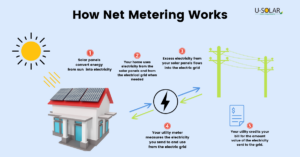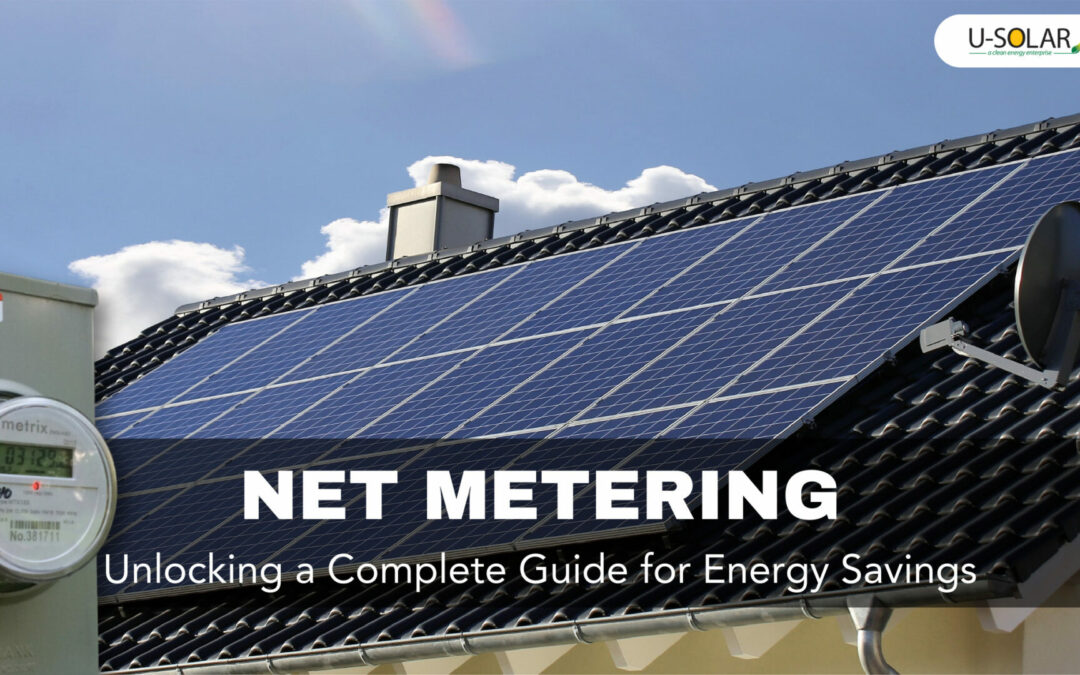This blog explores net metering, an innovative concept that is changing the way we generate and use energy. Discover the details and benefits of this cutting-edge strategy as we walk you through all of its aspects. Our goal is to simplify the difficulty so that you can understand net metering with ease.
Understanding Net Metering
What is Net Metering?
In the energy sector, net metering is innovative because it enables customers to generate excess energy from renewable sources, therefore balancing their power bills. An eco-friendly method involves connecting your energy system and the grid in both directions
Method of billing
Under net metering, the energy used (i.e., the difference between the total energy produced by the system and the total energy consumed) is billed to the owner. Net metering records the difference between the total power used by the owner and the excess power exported back to the grid. Therefore, excess energy generates income while the system supplies the energy that is in short supply. Regulations about the type of net meter used to record power may differ from state to state.
In certain states, the owner’s net power consumption can be determined with just one meter. Whereas, other states require two meters to record the total amount of units consumed by the owner from the grid along with the total amount of power generated by the owner’s system.
How Does Net Metering Work?

Net metering works by recording the energy your system produces and consumes. The excess energy flows back to the grid, earning you credits that offset your future energy bills.
The Key Benefits of Net Metering
1. Reducing Electricity Bills
Net metering allows consumers to generate their electricity using renewable energy sources from solar panels. By harnessing energy from the sun, individuals become less dependent on traditional utility providers, leading to a degree of energy independence.
2. Environmental Impact
Contribute to a greener planet by embracing net metering. The reduced reliance on conventional energy sources aids in curbing carbon emissions, fostering a sustainable environment.
3. Return on Investment:
Installing solar panels or other renewable energy systems involves an upfront investment. Net metering enables users to see a return on this investment by reducing or eliminating their electricity expenses over the system’s lifespan. This makes renewable energy more financially attractive.
4. Grid Support:
Distributed energy generation through net metering can help enhance the resilience and reliability of the electrical grid. By decentralizing power production, communities become less vulnerable to centralized failures, and excess electricity can be used to meet local demand.
Challenges of Net metering
1. Lower Buyback Rates Compared to Tariffs
The buyback rate that consumers receive for excess energy fed back into the grid and the rate at which they are charged for the electricity they consume (tariff rate). This scenario presents a challenge for individuals or businesses participating in net metering programs, as the compensation they receive for their surplus energy is lower than what they pay for the electricity they draw from the grid. This can addressed through installing additional capacity if possible capacities to balance out the total difference.
2. Anti-Islanding Function
Islanding occurs when a distributed energy system, like rooftop solar panels, continues to generate power during a grid outage, creating a localized “island” of electricity. While intentional islanding in certain situations can be beneficial, unintentional islanding poses risks to utility workers and the stability of the broader electrical grid. To ensure safety, the inverters enter into an anti-islanding mode when the grid electricity is missing. Hence when the grid experiences an outage you cannot avail net metering and avail solar energy, if you do not have an energy storage solution like batteries.
3. Limitation in maximum installable capacity
Solar installations in some part of locations there may be restrictions according to Solar and DISCOM policies on the size or capacity that can be installed. This limitation could be influenced by technical, regulatory, or grid-related factors and is an important consideration for those planning to integrate large-scale energy projects.
Conclusion
Net metering is a revolutionary approach to energy usage, not simply a marketing slogan. Remember that adopting net metering means more than simply saving money; it also means actively contributing to creating a more sustainable and clean future as you set out on this informative journey. Investing in solar power plants offers a combination of environmental benefits, financial returns, and long-term sustainability. As the world transitions towards cleaner energy solutions, solar power stands out as a wise and forward-thinking investment choice.
Frequently Asked Questions (FAQs)
1. Are There Any Upfront Costs to Install a Net Metering System?
Installing a net metering system may involve upfront costs, but the long-term savings and benefits far outweigh the initial investment.
2. How Can I Monitor My Energy Consumption with Net Metering?
Most net metering systems come with user-friendly interfaces, allowing you to monitor your energy production and consumption seamlessly.
3. Will Net Metering Work During Power Outages?
Net metering systems are designed to shut down during power outages to ensure the safety of maintenance crews working on the grid.
4. Is Net Metering Available Everywhere?
Net metering availability varies by location. Check with your local utility provider to determine if it’s an option in your area.
5. Can I Sell Excess Energy Back to the Grid?
In many regions, y\es! Net metering often allows you to sell surplus energy back to the grid, contributing to a more sustainable energy ecosystem.
6. How Can I Optimize the Efficiency of My Net Metering System?
Regular maintenance, proper installation, and use of energy-efficient appliances can optimize the efficiency of your net metering system.
7. How much capacity can I install through a net metering system?
There are different policies in different states regarding the maximum capacity feasible under net metering. Hence it is advisable to consult a solar expert to understand your potential.

